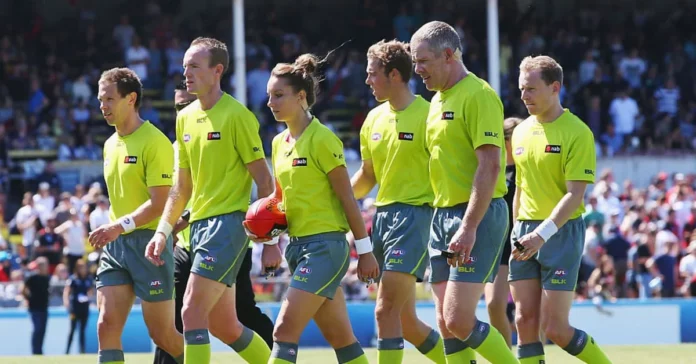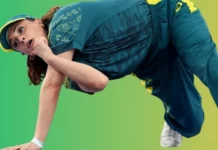You can read part 1 here.
It was in the early 2000s that I first noticed something was amiss with the umpiring of our great game.
Sure, prior to 2000 there were many games I went home unhappy with the job the umpires had done. But nobody could deny it was a difficult game to officiate, (the very thing that would later be exploited to control games for closeness and desired results), and sometimes the rub went your team’s way, sometimes the other. End of the day, it kind of balanced itself out, and if you played well enough, invariably your team would still win, regardless of a couple of umpire clangers.
But after the year 2000, a new era of officiating commenced.
It began with a particular umpire called Darren Goldspink, and it became obvious that if he was officiating your game against Essendon, you were probably going to need to do more than play well to win…. especially in finals.
However, this bias (from a man that drank at the Essendon Social Club, yet was still permitted to umpire their games) could never have prepared supporters for what was to come.
In 2003 the appointment of Andrew ‘3 chins’ Demetriou as CEO would see our game change permanently, and pockets, especially his own, get deeply lined. Each year he gave himself a significant $200,000 raise, and a self-granted bonus of $20,000 for every round that attracted a certain number of spectators to games. Which saw not only the already unfair fixture become even further compromised, but his already huge pay packet swell to as much as $3.8 million in 2013.
But the transfer of cash from the pockets of diehard blue-collar fans to the pockets of the AFL coffers was almost trivial in comparison to what was happening to the actual game.
The advertising rights to Friday Night Football alone had now become worth a billion dollars, and nobody leaves a billion dollars to chance. So this required top of the table clashes, and more importantly, close games. A first half blowout would see TV audiences changing channel at halftime, jeopardising the value of the advertising rights, and had to be averted at all costs. And the way to avert it was to give umpires total control over which way the ball went, and where free kicks were awarded.
Time after time I watched teams kick away to a four goal 1st quarter lead, only for the other team to be awarded soft free kicks in front of goal to even the scores, while other players could have their head torn off in the goal square, only to be rewarded with a call to “play on”.
Of course, at first, I noticed this with games involving my own team, so I wondered if it was just my natural bias toward them that made it seem unfair. So I started recording, scrutinising and documenting other clubs games. Going frame-by-frame through the frees that were paid, and the frees that weren’t, and noting where on the ground they were awarded. A shot on goal? Or in the backline? Which left absolutely no doubt whatsoever, that when it suited, the umpires took complete control. Teams that were initially on fire got rattled, pinged no matter what they did, and ultimately, they would never get their rhythm back and go on to lose. Then the last quarter of every such game, the ritual evening-out of the free kick count, always very cleverly done, letting ones go that should have been, or gifting a few the other way in the back half of the ground.
Of course, there were still blowouts. The odd one was unavoidable, and if they never happened, fans may suspect something was amiss. Sometimes teams just played so well there was nothing umpires could do about it, especially in open, high possession games, as umpire control came from the contested ball, at least, at that point. But they would later be gifted far greater powers that didn’t even involve the ball.
The controlling of televised games was so successful that by the mid 2000s it had crept into regular games. For example, keeping clubs like Richmond a mathematical chance of playing finals kept their hordes of supporters turning up to games, (and Demetriou his $20,000 attendance bonus), and their subsequent runs of coming ninth year after year. Positions in the final eight could be manipulated to try to ensure 2 finals in Melbourne during the first week. And above all, the successful implementation of an ‘even’ competition, where no team could be guaranteed a win. If a club’s members were becoming disheartened, a shock win against the comp’s leaders did wonders for moral.
But the AFL had a problem. Supporters, and especially club officials, were beginning to notice and get cranky. So in true socialist, dictatorial style, in 2005, the AFL banned any official or player commenting on umpire performance, later extending this to ejecting and banning supporters who did the same. Which meant, they could now cheat at will, and everybody was powerless to do or say anything about it.
To this day I question how an entity can legally ban a person’s Constitutional right to have and express an opinion. It would seem to me that their ruling is in fact highly unlawful.
Many, like myself, just hung in there, knowing full well that if I stopped attending games, stopped supporting, it would be the club I loved that suffered, not the AFL. The AFL knew that too, and used it to hold supporters to ransom. We were hopeful that if we just stuck it out, once Demetriou’s reign of terror was over, things would get back to normal. But the appointment of Gillon McLaughlin in 2014 didn’t see things get better. He had learned from his predecessor, and the socialist and totalitarian takeover of our greatest sporting asset rolled on, and things just got much worse.
Every AFL game became a platform for social and political reform. The rules of the game continued to be added to, and changed with such regularity that supporters were in a state of constant confusion, so that every time 2 players went for the ball, a legitimate free kick could be awarded to either, depending which way the umpire needed the ball to go. And if you looked on the replay, technically…(it could be argued), it was there. The introduction of the ‘deliberate out of bounds’ rule that could be so selectively applied, added another powerful string to the umpire’s bow. And then it got so bad a player could have the ball taken from him just for looking at the umpire, under the remonstration rule. Or simply because a team mate had looked at the umpire.
In 2019, after witnessing the worst and most blatent display of cheating I had ever seen, I walked out of the MCG for the final time. My heart was heavy. 44 years of my life had just come to an end. But if you had asked me, I would have still told you I barracked for Hawthorn. That is, until round 2, 2020, when ‘The Family Club’ dropped to one knee to show their support of an openly socialist organisation whose website states quite blatently that their goal is to destroy the traditional family unit. The hypocrisy and gutlessness of that action deserves no following.
Of course, fans walking away from the game are of no consequence to the AFL. Us old boys can leave. Like all socialist movements, their focus is on the children that will grow up only knowing the game like this, and accepting of the conditioning of their social behaviour and thinking before, during and after each game.
The methodic destruction of the greatest game in our history, is a perfect and classic example of how Socialist ideology has worked and infiltrated every part of the culture that we once held dear, and how we have allowed it to happen. And also of the enormity of what we have allowed to be lost.
The only difference between AFL football and World Federation Wrestling now is that in AFL, the players are not part of the act.










